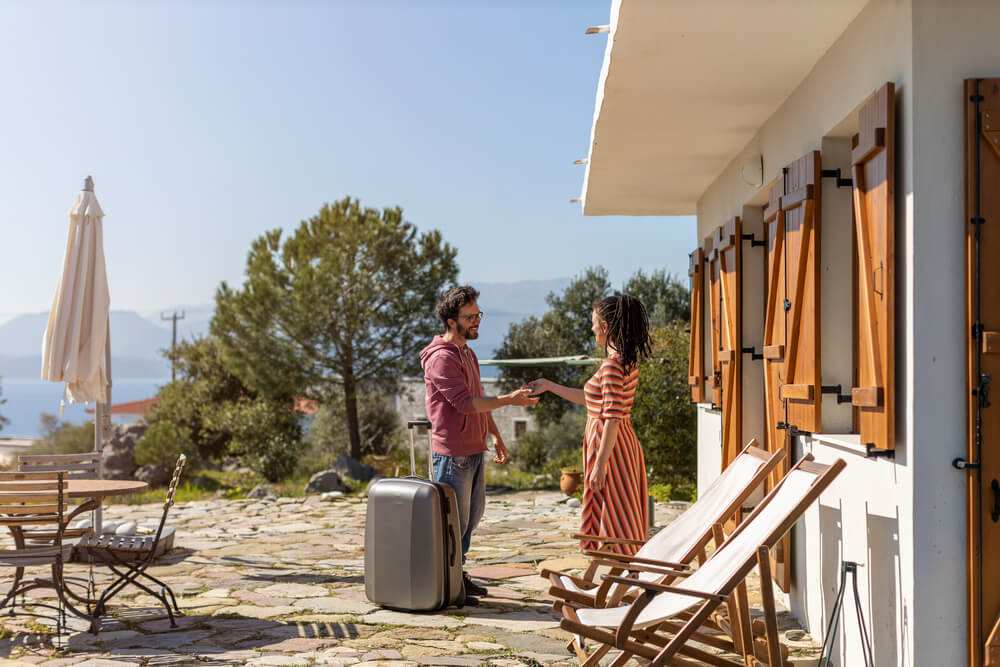As you are shopping on Airbnb for a short-term rental, whether for vacation, business, attending an event, or whatever, you may notice a little icon that looks like a badge hanging from a ribbon on the host’s profile photo.
When you see that, you’ll also see in the text near the top of the listing “[Name of host] is a Superhost,” which Airbnb goes on to define this way: “Superhosts are experienced, highly rated hosts who are committed to providing great stays for guests.”
Not only can you as a prospective guest be on the lookout for this designation, you can filter your search through the listings to include only those hosted by Superhosts. Perhaps because Superhosts are especially vigilant about the guest experience, some guests wonder whether the Superhost actually stays in the rental with guests.
This blog post addresses that idea, along with how trustworthy the Superhost designation really is, whether booking with a Superhost will guarantee a great stay, and whether booking with a host who’s not a Superhost is a big risk.

What is an AirBNB Superhost?
Let’s look at what a Superhost is and what takes to become a Superhost to see how the criteria may impact you as a guest.
Star ratings
To be a Superhost, a host must have an overall star rating of at least 4.8 stars. Stars, of course, are generated through guest reviews. You, as a guest, rate your overall stay (from 1 to 5 stars), as well as components of the experience, such as how accurate the listing is compared to what you observed while staying in the Airbnb rental, how well the host communicated with you, how clean the place was, how easy it was to check in, among other factors. Clearly a host’s overall star rating has an impact on a guest’s potential stay. While not every review is the pinnacle of honesty, a critical mass of great reviews is a strong indicator that you will have a positive experience as a guest.
Response rate
This statistic is based on the percentage of time a host responded to any communication from a guest or prospective guest within 24 hours. The minimum percentage of within-24-hours responses needed to be a Superhost is 90 percent. Naturally, if you’re planning a trip and need to get it nailed down, you want to have your questions answered as quickly as possible. The same applies when you’re already staying at the Airbnb property, and a problem develops or you can’t find a piece of needed equipment. No matter the circumstances, it’s reassuring when a host responds to you right away. When you encounter a host who is responding to guests within 24 hours 90 percent of the time, it’s a good bet that you’ll get fast answers when you need them.
Cancellation rate
For many guests, this may be the most important Superhost marker. No guest likes to have their booking canceled after making plans, especially if it’s canceled on short notice. To be a Superhost, a host’s cancellation rate must be less than 1 percent (in addition, hosts are usually penalized when they cancel on guests). A guest can feel fairly confident their booking won’t be canceled when booking from a Superhost.
Number of stays hosted
This stat is probably the least important from the guest perspective. If a host’s property is booked most of the time, sure, it may mean the host offers a terrific property and experience. But many variables can enter into number of stays hosted, such as pandemics, weather, natural disasters, seasonality, and simply hosts’ desire to use their properties for themselves and family and friends, part of the year. Some hosts don’t strive for full occupancy but are still excellent hosts. Similarly, properties that book at a relatively low price point may be fully booked, but that doesn’t necessarily mean they have a great host offering excellent stays. In any case, the Superhost criteria for number of stays is 10 completed stays or 100 nights over 3+ stays. The latter criterion accounts for hosts who offer longer-term stays; for example, if a host typically hosts 1-3-month stays, it might be difficult to rack up 10 stays in a year (and many local jurisdictions now require stays of at least 30 days). This category is the hardest for hosts to achieve and the one most likely to keep them from Superhost status.
Does a Superhost Stay With You?
Back to the question, “Does a Superhost stay with you?” Some hosts live near their Airbnb rentals – sometimes on the same property.
Examples are homes with a rented basement apartment where the host lives on the floor above or a duplex, where one side is rent, and the host lives in the other side. The host may have a home on the same piece of land as the rental.
Typically, these arrangements are clearly disclosed in the Airbnb listing, so if you don’t like the idea of having the host nearby, you should not book that kind of property.
Look for “whole home” listings because Airbnb also offers listings that are indeed shared homes where you are staying in the same dwelling in which the host lives, usually renting out just one bedroom or suite in the home.
Superhosts are no more likely than any other host to live close to the Airbnb property or offer shared-home arrangements.
So, the answer to the question, “Does a Superhost stay with you?” is no, unless the Superhost is offering a shared-home situation. “Superhost” is not code for a hovering, watchful host.
Airbnb assesses Superhost status every quarter – January, April, July, and October, so the stats must be kept up each time. As of a 2020 research study, less than 20 percent of Airbnb hosts were Superhosts, so Superhost properties do have a certain special cachet.
We can see that a Superhost designation is probably a good bet for a positive experience, but it’s not a guarantee. Some hosts regularly achieve Superhost status but are not the greatest hosts. Conversely, some hosts rarely achieve Superhost but are absolutely wonderful.
While booking with a Superhost will most likely be a positive experience, you can conduct further due diligence to ensure a great stay. These steps also work if you are trying to justify the risk of booking from a host who’s not a Superhost:
- Read the entire Airbnb listing carefully to check for red flags that might throw a wet blanket on your stay. Pay attention to the “Other Things to Note” section of the listing, which may detail amenity limitations or disclose negatives like pests in rural and wooded areas, potential for noise, the fact that the host lives elsewhere on the same property, or that there are stairs to climb that would be difficult for elderly or disabled guests.
Check out the host’s house rules, which can be onerous. One host we know offers no dishwasher and no air conditioning, which can be deal breakers for many guests. Also carefully review the listing’s photos. Once booked, see if the host has a House Manual you can peruse and some sort of guide to the local area.
Airbnb doesn’t permit hosts to post videos, but you can try searching for the property on Google, YouTube, or other vacation-rental platforms to see if you can find a video tour of the property that will boost your confidence in booking there. - Read the reviews. Even if the host’s reviews are uniformly glowing, you may find small clues to aspects of the place that turn you off. One host had several guests who said her place was hard to find in the dark, which might be enough to nix this place for some prospective guests.
- Look for the experience factor. You’ll note that while Airbnb partially defines Superhosts as “experienced hosts,” a Superhost may actually not be very experienced, as it’s possible to earn Superhost in the very first one or two quarters in business. A host who has hosted at least 30-50 stays is likely to be experienced and trustworthy.
- Request a conversation with the host. Some guests just feel better after talking to a host and have a gut feeling that reassures them. Very few guests read a host’s profile on their Airbnb listing, but it, too, can give you a good feel for the quality of the host.
- Check reviews on other platforms. Many hosts list their properties on multiple platforms, such as VRBO, in addition to Airbnb. Take a look at reviews on other platforms to see if the reviews are as good as they are on Airbnb.
- Take note of the level of communication you receive from the host. While it can be annoying to be bombarded with information about the property and the stay, it’s generally true that the more a host communicates, the more you can trust the quality of the stay.
Bottom Line
Hosts who seek Superhost status are typically highly motivated and customer-service-driven. Using the Superhost designation as a criterion for booking an Airbnb property is essentially reliable, but not foolproof.
To firm up your chances of having an amazing experience, it will certainly not hurt to do some additional research. And, if you don’t want a rental where the host shares and home or lives close by, be sure to do your research, but don’t worry about this happening just because the host is a Superhost.
